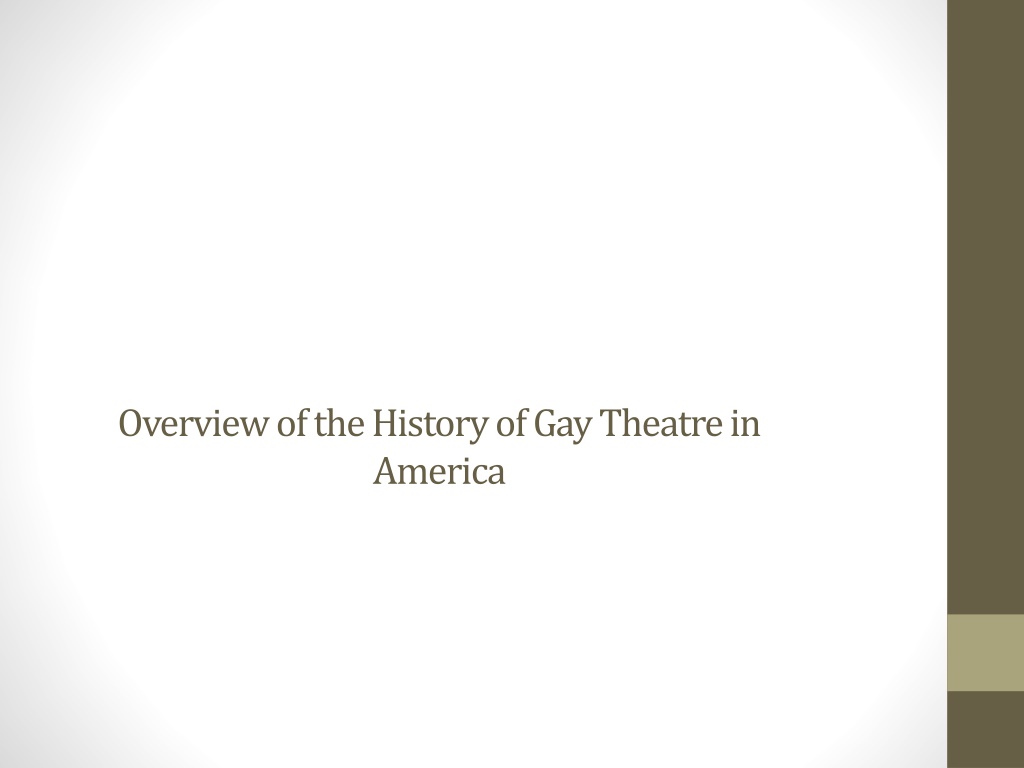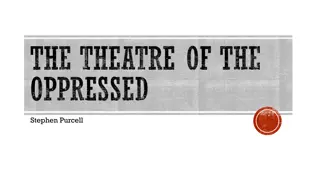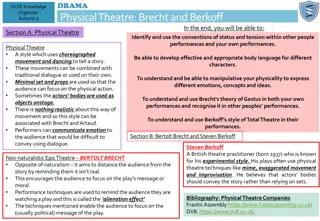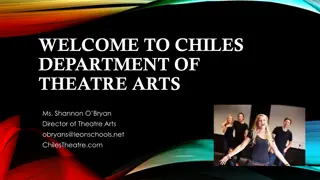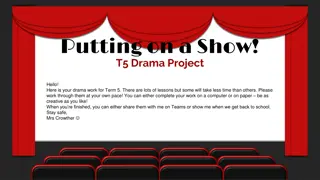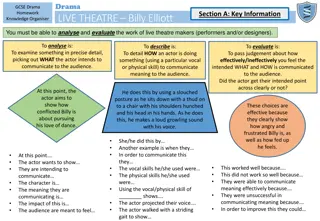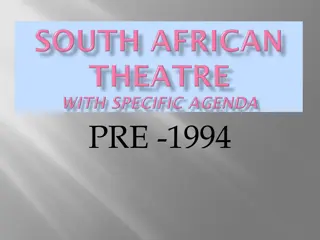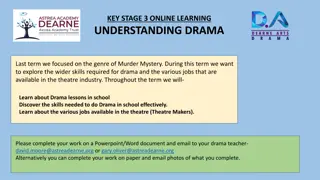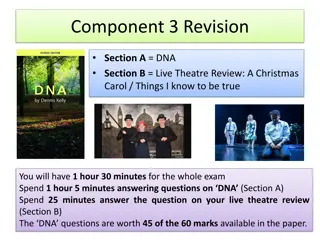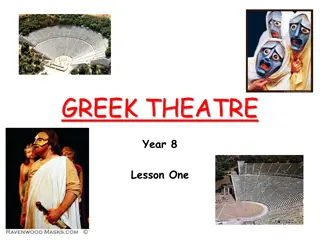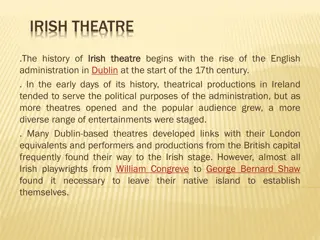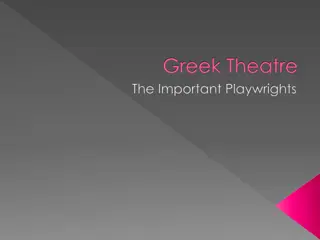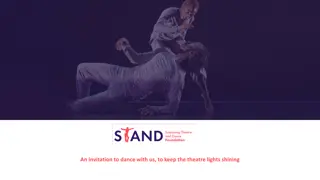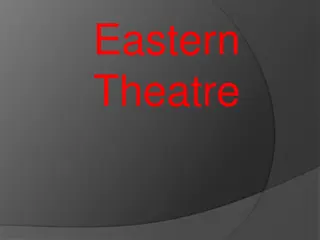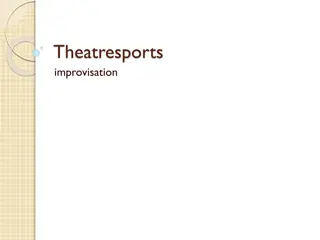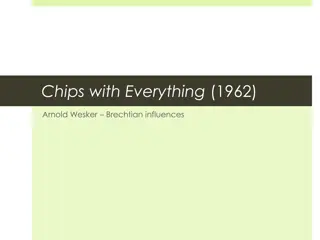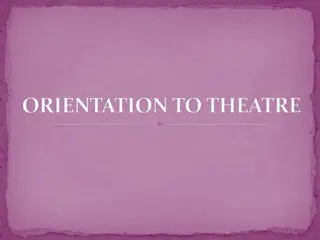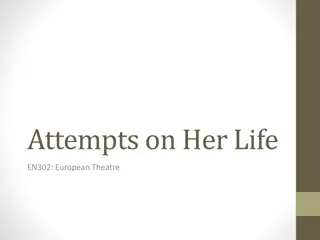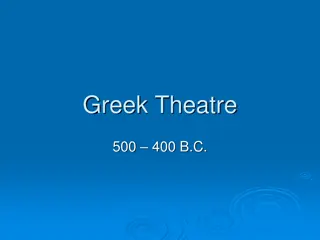Evolution of Gay Theatre in America
Gay theatre in America has overcome societal challenges, censorship, and stereotypes to emerge as a vibrant and essential part of the theatrical landscape. From the early struggles of gay playwrights like Oscar Wilde and Tennessee Williams to the groundbreaking works of the Caffe Cino and the impact of seminal plays like "The Boys in the Band," the history of gay theatre reflects the resilience, creativity, and diversity of the LGBTQ+ community.
Uploaded on Sep 25, 2024 | 0 Views
Download Presentation

Please find below an Image/Link to download the presentation.
The content on the website is provided AS IS for your information and personal use only. It may not be sold, licensed, or shared on other websites without obtaining consent from the author. Download presentation by click this link. If you encounter any issues during the download, it is possible that the publisher has removed the file from their server.
E N D
Presentation Transcript
It seems almost inconceivable today, with the abundance of openly gay playwrights and gay-themed plays, that less than 50 years ago a drama critic for The New York Times felt the need to call for social and theatrical convention to be widened so that homosexual life may be as freely dramatized as heterosexual life, may be as frankly treated in our drama as in contemporary fiction. EARLY GAY PLAYWRIGHTS: Oscar Wilde, Noel Coward, Tennessee Williams, William Inge, and Edward Albee, LanfordWilson, Robert Patrick. Doric Wilson. At the height of the Pansy Craze in the late 1920s, Mae West penned The Drag, a social problem play that argued for sympathetic treatment of homosexuals. However, after out-of-town tryout runs, the play received a scandalous reception. Never making it to the Great White Way, The Drag was censored, and West was arrested. Draconian measures from City Hall, including the passage of New York City s 1927 padlock bill, prohibited homosexual subject matter on the Broadway stage. A few years later, the Hays Code of 1934 banned images of homosexuality on the Hollywood screen. Consequently, censorship of gay themes in theater and film was the norm in the U.S. from the 1930s through the 1960s. Expanding on the concept of the coffeehouse as a forum for beatnik poetry readings, Joe Cino opened his small Cornelia Street caf in 1958 with the intention of creating a space where theater artists could develop their individual voices and form a community. The Caffe Cino s locale rendered it out-of-the-way enough to feel like a private sanctuary and accessible enough for urban audiences to find it. Inside, the Cino resembled a converted living room decorated for a very festive occasion. Its walls were encrusted with glitter and spangles, strung with flapping photographs, flickering Christmas lights, and twinkling wind chimes, with a shiny jukebox in the corner. Cino wanted his caf to be a magic box that would feel like home but simultaneously conjure a sense of child-like fantasy, play, and nostalgia. IF GAY THEATER is defined as being by, for, and about un-closeted gay people, then 2014 arguably marks the 50th anniversary of the genre s existence. In 1964, despite a social climate of homophobia that pervaded American life for the second third of the 20th century, two one-act plays presented Off-Off-Broadway at the Caffe Cino revolutionized how gay characters could be represented theatrically. The plays were Lanford Wilson s The Madness of Lady Bright and Robert Patrick s The Haunted Host.
In 1968 a play opened in New York that portrayed gay life onstage in a way it had never been before. In the words of another Times critic, Clive Barnes, it was by far the frankest treatment of homosexuality I have ever seen on the stage. Mart Crowley s The Boys in the Band made theatrical history for gay theater just as Lorraine Hansberry s A Raisin in the Sun, had done in the previous decade for African-American drama. The Boys in the Band played 1,001 performances Off Broadway and was then filmed by William Friedkin with the original cast, marking a cinematic milestone as well. Over the years critics within the gay community have criticized Crowley for presenting stereotyped characters and an excessively negative view of gay life. Yet this play, staged a year before the Stonewall Riots that are often cited as the beginning of the modern gay civil-rights movement, portrays the humor and resilience of the characters as well as their pain. New York s gay community had grown weary of the police department targeting gay clubs, a majority of which had already been closed. The crowd on the street watched quietly as Stonewall s employees were arrested, but when three drag queens and a lesbian were forced into the paddy wagon, the crowd began throwing bottles at the police. The protest, however, spilled over into the neighboring streets, and order was not restored until the deployment of New York s riot police. The Stonewall Riot was followed by several days of demonstrations in New York and was the impetus for the formation of the Gay Liberation Front as well as other gay, lesbian, and bisexual civil rights organizations. It is also regarded by many as history s first major protest on behalf of equal rights for homosexuals. Martin Sherman s Bent opened in London with Ian McKellen in 1979 and then in New York with Richard Gere. Sherman dramatized, in fictional form, the plight of gay men in Nazi Germany who were arrested and sent to concentration camps for their sexual orientation. Bent not only brought to audiences attention tragic historical events of which they may heretofore been unaware. Harvey Fierstein s Torch Song Trilogy, originally produced in 1978 and 1979 as three separate plays by La MaMa E.T.C., became a one-evening trilogy Off Broadway in 1981 and 1982. It moved to Broadway later in 1982, ran for more than 1,200 performances, and won Tony Awards for Fierstein in both the best play and best actor in a play categories. A contemporary comedy about a gay man s relationship with his lover, ex-lover, mother, friends, and adopted son, the play touched on such topics as gender identity, coming out, gay bashing, and gay parenting well before these issues were being discussed and analyzed the way they are today.
When FiersteinsSafe Sexopened in 1987, the gay community had been galvanized by the AIDS Pandemic that was causing widespread devastation through its ranks. Just as AIDS transformed the gay community as a whole, it transformed gay playwriting as well, becoming an almost unavoidable source of subject matter. The irony that AIDS made the gay community more visible than it had ever been before was not lost on one of Fierstein s characters in Safe Sex: Now they know who we are. ... We ve found our voices. We know who we are. They know who we are. And they know that we care what they think. And all because of a disease. A virus. A virus that you don t get because you re Gay, just because you re human. We were Gay. Now we re human. Larry Kramer s The Normal Heart, the longest-running production ever presented at The Public Theater, is suffused with anger and outrage at the lack of response to the crisis by the medical establishment, politicians, society as a whole, and the gay community itself. Based on Kramer s own experiences as an early gay activist and founding member of Gay Men s Heath Crisis (G.M.H.C.), it is part polemic, part call-to-arms, and part love story The Normal Heart pulled no punches in confronting its audiences with the enormity of AIDS and its devastation of the gay community.
Although many successful plays dealing with AIDS followed in the 1990s including Terrence McNally s notable Love! Valour! Compassion! none had a more profound and lasting impact than Tony Kushner s Angels in America, the first part of which, Millenium Approaches, was given its New York premiere in 1992 at Juilliard when Kushner was a playwright-in-residence at the School. Awarded the Pulitzer Prize for drama and two successive Tony Awards for Millenium Approacesand Perestroika, it was later filmed by Mike Nichols for HBO. Subtitled A Gay Fantasia on National Themes, Angels in America mixes historical and fictional characters, humor and heartbreak, to dramatize not only the effect that AIDS had on gay Americans but how they are inextricably bound into the fabric of American life. List of TV Series and Characters from 1970 Today https://en.wikipedia.org/wiki/List_of_dramatic_television_series_with_LGBT_characters Comprehensive List of Films with LGBT Themes https://en.wikipedia.org/wiki/List_of_LGBT-related_films
G Gemini (play) Geography Club (play) The Goat, or Who Is Sylvia? The Green Bay Tree Gross Indecency: The Three Trials of Oscar Wilde The Gulf (play) H Her Naked Skin High (play) The History Boys Holding the Man (play) Hosanna (play) The Hot l Baltimore The Hungry Woman I I Am My Own Wife In Gabriel's Kitchen The Invention of Love J 0 9 8 (play) A Agokwe The AIDS Show Angels in America: A Gay Fantasia on National Themes Another Country (play) Arias with a Twist As Is (play) Asmara Songsang B Balm in Gilead Bathhouse: The Musical! Be Happy Be Mormon Beautiful Thing (play) Bent (play) Blowing Whistles Body Awareness Boston Marriage (play) The Boys in the Band (play) Break Through (play) Breaking the Code Burning Blue C Casa Valentina Cat on a Hot Tin Roof The Children's Hour (play) Christine Jorgensen Reveals Cloud 9 (play) Corpus Christi (play) D Deathtrap (play) The Destiny of Me Dog Sees God: Confessions of a Teenage Blockhead The Drag (play) Dress Suits to Hire E Eastern Standard Edward II (play) Elegies for Angels, Punks and Raging Queens Elizabeth Rex Entertaining Mr Sloane Execution of Justice F Fifth of July The Fire that Consumes The First Domino Fortune and Men's Eyes Fucking Men Jagdszenen aus Niederbayern (play) Jerker Joni and Gina's Wedding The Judas Kiss (play) L The Laramie Project Last Summer at Bluefish Cove Latin! or Tobacco and Boys Lilies (play) The Lily's Revenge Lips Together, Teeth Apart The Lisbon Traviata The Little Dog Laughed Lonely Planet (play) Loot (play) Lord Arthur's Bed Love the Sinner Love! Valour! Compassion! Lulu (opera) M M. Butterfly The Madness of Lady Bright Le Martyre de saint S bastien Measure for Pleasure Melancholy Play The Men from the Boys Miracle Day Mother Clap's Molly House Mothers and Sons (play) My Big Gay Italian Wedding My Night with Reg My Own Private Oshawa N The Nance Next Fall The Night Larry Kramer Kissed Me No Exit The Normal Heart Norman, Is That You? O Observe the Sons of Ulster Marching Towards the Somme Old Times Oscar Wilde (play) P Plague Over England The Pride (play) Privates on Parade Proud (play) P.S. Your Cat Is Dead The Public (play) R The Ritz (play) Rose by Any Other Name... Ross (play) S Scent of Rain Secrets of a Gay Mormon Felon Seduction (2004 play) Semi-Monde Six Degrees of Separation (play) Slavs! Some Men Sons of the Prophet Staircase (play) Stop Kiss Streamers (play) A Streetcar Named Desire Suddenly, Last Summer
